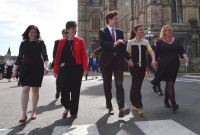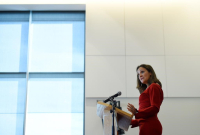Support strong Canadian climate journalism for 2025
Federal Labour Minister Patty Hajdu says the Trudeau government is trying to play "matchmaker" by addressing some labour shortage gaps while helping science students find their first jobs.
“This is really focused, right now, on the STEM fields, so the science, technology, engineering and mathematics (fields), and the business field,” Hajdu told National Observer Monday while in Vancouver for Labour Day.
Hadju has spent the past week doing a series of announcements across the country to promote the federal government’s investment of $73-million, over four years, in as many as 10,000 co-op student work placements. She continues her tour with an event in Vancouver on Tuesday.
“There is a significant workers’ shortage in those fields, and it’s in response to concerns from industry, and from small business, all the way up to larger corporations, that are saying that they can’t find the Canadian talent that they need to fill the positions that they have," she said.
“So this is really specifically to try and boost up, I suppose if you will, play matchmaker, between the number of students that are graduating from those sectors with demand that employers are saying that they have.”
The funding will help industry organizations work with universities and colleges to develop curriculum and deliver programs that will provide more opportunities for students to work directly in their chosen fields, Hajdu said.
The government has already partnered with the Information Technology Association of Canada, the Information and Communication Technology Council, the Canadian Council for Aerospace and Aviation, the Environmental Careers Organization of Canada, and Biotalent Canada.
Hajdu’s press secretary Matt Pascuzzo said the government continues to work toward finding more partners.
In an e-mail, Pascuzzo explained employers in the program will get 50 per cent of co-op students’ wages subsidized. That subsidy rises to 70 per cent when an employer takes on a first-year student or a student from an under-represented group including, “women in STEM, Indigenous students, people with disabilities and newcomers.”
The subsidized wages per student would only be for the initial stages of employment. It would be capped at $5,000 for the 50-per-cent group or $7,000 for the 70-per-cent group.
“That extra incentive is something that we’ll be monitoring really closely to see, does it actually make a difference in terms of diligence on behalf of the employers to seek out those individuals and I think to balance their workforce,” Hajdu said.

More work needed
Candace Wasacase-Lafferty, the director of Indigenous Initiatives at the University of Saskatchewan in Saskatoon, described the new student placement program as an opportunity to build students’ knowledge and networks, but cautioned more work needs to be done.
“I think if you don’t have the networks or multiple generations of families who are working in the mainstream world it’s difficult for a lot of Indigenous students to get their foot in the door,” she said Monday.
The next step, she said, is for companies to work toward identifying star Indigenous employees and provide them with continued leadership and career development and support for education.
“Until Indigenous students are challenging all occupations at all levels, whether it be entry, middle, or senior management, then I think co-op programs only should grow,” Candace Wasacase-Lafferty said.
“I think it’s not enough to bring in young people at the bottom of your organization, we must have laddering programs that help Indigenous people excel in mainstream work environments. It’s just not enough.”
Last week, Hajdu and Prime Minister Justin Trudeau met with Indigenous students at the University of Saskatchewan.
Among them was Autumn Tuttroen, a third-year student pursuing a degree in social work.
Her field falls outside the target areas for the new work placement program.
“What I would want to … see is more opportunities for students who are pursuing degrees in the arts,” the 29-year-old said.
Though Hajdu said she has also heard from students in non-science, technology and business fields, at this point the government’s policy is focused on meeting a labour shortage.
“As we move forward, if we see that there’s a challenge in other sectors we’re not opposed to looking at expanding the criteria," she said. "It’s just at this particular time we felt there was a real need within those sectors.
“They’re very good paying jobs and there’s a lot of anxiety for students in those fields of study in particular that they won’t have the opportunity to work in their field. So we really wanted to address those concerns.”
While applauding the government’s efforts, the Canadian Association of Student Associations also said in a statement last week it hoped that in the future, “opportunities will be made available to students from all programs…”
Hajdu said the program will be monitored on an ongoing basis over the next few years, in part to find out, “Does this actually lead to employment post-co-op for that individual in that company?”

Cabinet priorities during NAFTA negotiations
In her interview with National Observer, Hajdu also had some choice words for opposition critics of the government’s approach to NAFTA renegotiations.
Asked whether she is working on ongoing discussions of NAFTA as minister of employment, workplace development and labour, Hajdu pointed to the government’s “list of bargaining priority areas” for NAFTA negotiations.
“One of them is gender, (another) one is the rights of Indigenous people. Unlike our Conservative counterparts, we believe that it’s really important when we’re talking about the growth of a country that it’s an inclusive growth, and that everybody sees themselves as prospering from trade deals,” Hajdu said Monday.
“So we’re going to continue to push on those agendas, including the rights of workers, and that’s a really important part and opportunity, if you will, (a) silver lining, of renegotiating NAFTA.”
On the weekend, The Canadian Press reported the Conservative Party's new foreign affairs critic, MP Erin O'Toole, said his party has no time for "virtue signalling" as part of NAFTA renegotiations.
The MP for Durham, Ont., who ran for the federal Conservative party’s leadership and served as veterans affairs minister in former prime minister Stephen Harper’s cabinet, signaled his support for the Trudeau government's NAFTA renegotiation efforts.
But he qualified that he supports advocating job creation, labour competitiveness, and market access as part of the North American Free Trade Agreement, not bargaining on gender, Indigenous and environmental issues.
O’Toole’s comments were met with derision on social media from Trudeau’s principle secretary, Gerald Butts, and Environment Minister Catherine McKenna.
In addition to a post on Twitter describing environmental protection as “smart economics not ‘virtue signalling’,” McKenna posted at length on Facebook. She challenged the idea that environment protection is a “bauble” or Indigenous rights are a “frill,” and wrote that taking up gender rights as part of NAFTA “is just a start.”







Comments